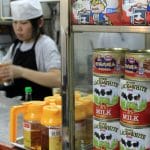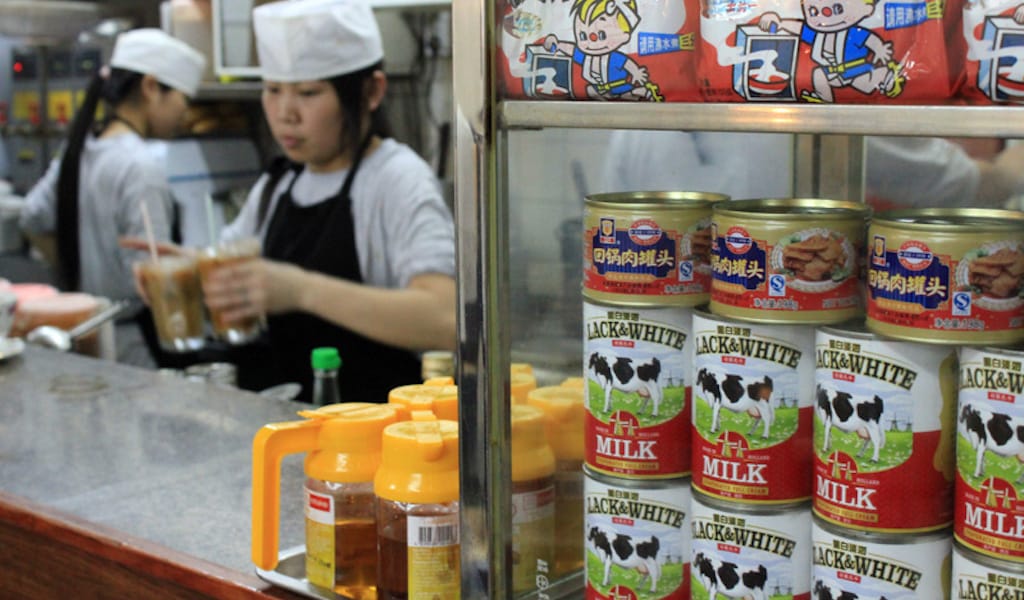Confucius once said, “The superior man is modest in his speech, but exceeds in his actions.” He clearly never met a food writer, because superlatives and immodest speech are basically all we have to work with. But had Confucius opened a small patisserie, it would probably be Lillian Cake Shop.
Lillian’s has a sign over the counter that timidly boasts in Mandarin: “Probably the best egg tarts in Shanghai.” One bite in, and you realize that’s sort of like Yao Ming saying, “I’m pretty good at basketball” or Meryl Streep saying, “I think I can pull off that accent.” Every time we visit one of this small local chain’s stores around the city, we’re always checking to see if the consistency is off, or if there’s a batch that came out a little burnt. But that’s the thing about Lillian’s, no matter whether it’s a small storefront or a café in a mall: these little treats are baked to perfection.
For the uninitiated, imagine the perfect egg tart as a bit of crème brûlée nestled in a fresh croissant. It’s not a perfect analogy, but it’s close. The crust needs to be soft and flaky while retaining the circular shape, and the egg filling must have a touch of sweetness that harmonizes with the egg custard. The egg tart originated at a monastery in Lisbon, but found its way to China through Macau, the former Portuguese colony. The dessert finally landed on dim sum menus in Hong Kong, then the Mainland, and is now situated at the top of the famously short list of “delicious Chinese desserts.”
An egg tart at Lillian’s is a perfect midday snack or end-of-the-meal quencher for sweet tooths. We sampled tarts on a trip to Lisbon (where they are sometimes served cold, and with a dash of cinnamon on top), and there’s nothing lost in translation here. The bit of humility that Lillian’s portrays on their signage turns endearing once you’ve bitten into the warm, fresh egg tart in its impossibly flaky shell. The turnover is high here, so you’re almost guaranteed a fresh-out-of-the-oven treat. The eggy custard is lightly seared on top and wrapped in a resilient croissant-like bucket. It’s gone in one or two bites, and you’ll need another. At RMB 4 each, you may as well just grab a box.
And what would Confucius have to say about that? We’re not sure, but he told us once on the Internet, “Things that are done, it is needless to speak about… Things that are past, it is needless to blame.” Clearly he’s referring to the box of tarts you bought to take away. We won’t tell.
 November 9, 2017 Cha’s
November 9, 2017 Cha’s
Hong Kong native and Cha’s owner Charlie Lau became a restaurateur because of a […] Posted in Shanghai November 12, 2013 Roast Duck
November 12, 2013 Roast Duck
The Chinese have appreciated the finer qualities of roast duck for millennia, and in […] Posted in Shanghai October 2, 2017 Mid-Autumn Mooncakes
October 2, 2017 Mid-Autumn Mooncakes
Mid-Autumn Festival (中秋节, zhōngqiūjié) lands on the 15th day of the eighth lunar month, […] Posted in Shanghai
Published on September 05, 2012
Related stories
November 9, 2017
ShanghaiHong Kong native and Cha’s owner Charlie Lau became a restaurateur because of a hankering. A movie producer by day, Lau came to Shanghai with Ang Lee to film Lust/Caution, and was disappointed that Shanghai lacked a proper Hong Kongese cha canting, a casual all-day eatery that serves traditional Cantonese food alongside milk teas and…
November 12, 2013
ShanghaiThe Chinese have appreciated the finer qualities of roast duck for millennia, and in that time, they’ve refined their cooking techniques into a virtual art form. The first mention of roast duck (烤鸭, kǎoyā) dates back to the Northern and Southern dynasties (A.D. 420–589). By the Yuan Dynasty (1206-1368), the tawny bird was gracing the…
October 2, 2017
ShanghaiMid-Autumn Festival (中秋节, zhōngqiūjié) lands on the 15th day of the eighth lunar month, relatively near the autumnal equinox; in 2017, it falls on October 4 and coincides with the National Day holiday. Also sometimes called Mooncake Festival, it’s a public holiday in China and Taiwan on which families gather to give offerings to the…

















































































